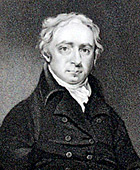William Lisle Bowles (September 24, 1762 - April 7, 1850) was an English poet and critic.
He was born at King's Sutton, Northamptonshire, where his father was vicar. At the age of fourteen he entered Winchester College, the headmaster at the time being Dr Joseph Warton. In 1781, Bowles left as captain of the school, and went on to Trinity College, Oxford, where he had won a scholarship. Two years later he won the chancellors prize for Latin verse. In 1789 he published, in a small quarto volume, Fourteen Sonnets, which were received with extraordinary favour, not only by the general public, but by such men as Samuel Taylor Coleridge and Wordsworth.
The Sonnets even in form were a revival, a return to an older and purer poetic style, and by their grace of expression, melodious versification, tender tone of feeling and vivid appreciation of the life and beauty of nature, stood out in strong contrast to the elaborated commonplaces which at that time formed the bulk of English poetry. After taking his degree at Oxford, Bowles entered the church, and was appointed in 1792 as vicar of Chicklade in Wiltshire. In 1797 he received the vicarage of Dumbleton in Gloucestershire, and in 1804 became vicar of Bremhill in Wiltshire. In the same year he was collated by Bishop Douglas to a prebendal stall in Salisbury Cathedral. In 1818 he was made chaplain to the Prince Regent, and in 1828 he was elected residentiary canon of Salisbury.
The longer poems published by Bowles are not of a very high standard, though all are distinguished by purity of imagination, cultured and graceful diction, and great tenderness of feeling. The most extensive were The Spirit of Discovery (1804), which was mercilessly ridiculed by Byron; The Missionary of the Andes (1815); The Grave of the Last Saxon (1822); and St John in Patmos (1833). Bowles is perhaps more celebrated as a critic than as a poet. In 1806 he published an edition of Alexander Pope's works with notes and an essay, in which he laid down certain canons as to poetic imagery which, subject to some modification, were later accepted, but which were received at the time with strong opposition by admirers of Pope and his style. The controversy brought into sharp contrast the opposing views of poetry, which may be roughly described as the natural and the artificial.
Bowles maintained that images drawn from nature are poetically finer than those drawn from art; and that in the highest kinds of poetry the themes or passions handled should be of the general or elemental kind, and not the transient manners of any society. These positions were attacked by Byron, Thomas Campbell, William Roscoe and others, while for a time Bowles was almost solitary. William Hazlitt and the Blackwood critics came to his assistance, and on the whole Bowles had reason to congratulate himself on having established certain principles which might serve as the basis of a true method of poetical criticism, and of having inaugurated, both by precept and by example, a new era in English poetry. Among other prose works from his prolific pen was a Life of Bishop Ken (2 vols., 1830-1831). Other works are Coombe Ellen and St. Michael's Mount (1798), The Battle of the Nile (1799), The Sorrows of Switzerland (1801), etc.
Bowles also enjoyed considerable reputation as an antiquary, his principal work in that department being Hermes Britannicus (1828).
His Poetical Works were collected in 1855, with a memoir by George Gilfillan.
Bowles was an amiable, absent-minded, and rather eccentric man. His poems are characterised by refinement of feeling, tenderness, and pensive thought, but are deficient in power and passion.
Biography from: Wikipedia.org |






